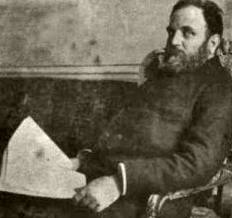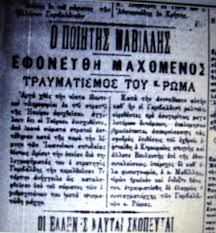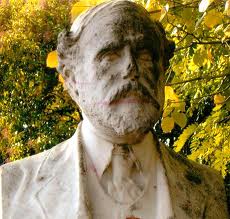“Who forget the past, it is obliged to relive it”
Lorentzos Mavilis was born in 1860 in Ithaca but Spanish origin. His grandfather, father was consul of Spain in Corfu, where his family was installed. This is where he spent most of his life. Exterior Lorentzos Mavilis was broad, azure eyes and blond. In 1880 decided to go to Germany to studied philology and philosophy. The  study was continued for 14 years, and indeed was influenced by the theories of Nietzsche, “criticism of the Net Speech” of the rational Kant and by the “Voluntarist” Arthur Schopenhauer. Even dealt with the sanskrit philosophical texts and translated extracts from the Indian epic Mahabharata. While in Germany addressed the composition lyrical poems (mainly sonnets), and chess theories and problems, published in German forms. In 1887 he entered the tournament chess in Frankfurt. Two years later (1889) took part in the chess tournament capital of south Silesian Wroclaw (Breslau) with the name Sillibam. In 1896 the Mavilis participated in the revolution of Crete, fighting with the rebels the Cretan mountains. And in 1897 in the Turkish-greek civic war gathered seventy Corfu volunteers and went to fight on the continent, where and was injured in the hand. The costs of the campaign volunteers the covered himself. In 1909 the enthusiastic kyrikos of revolution and in 1910 was elected as a member of Corfu. In 1911 arguing for the municipal language as a representative and member of the review meeting in Corfu in the Greek Parliament said addressing the Language of the scholars. “Vulgar Language does not exist. There is a vulgar people, and many vulgar speakers of the Language of the scholars”. (“No 7515 of the debates in the House’, B’ Revisionist House, 1911, p. 689, meeting 36). On 28 November 1912 becomes head of the company of volunteers Garivaldi and killed in the battle of the Driskos close in Ioannina in the First Balkan War. He is said to have had erotic relationship with the poet Myrtiotissa – born Teona Draκopoulou – (1885-1968), which served the love poetry and the poem “What else my” (1925) is devoted to the memory.
study was continued for 14 years, and indeed was influenced by the theories of Nietzsche, “criticism of the Net Speech” of the rational Kant and by the “Voluntarist” Arthur Schopenhauer. Even dealt with the sanskrit philosophical texts and translated extracts from the Indian epic Mahabharata. While in Germany addressed the composition lyrical poems (mainly sonnets), and chess theories and problems, published in German forms. In 1887 he entered the tournament chess in Frankfurt. Two years later (1889) took part in the chess tournament capital of south Silesian Wroclaw (Breslau) with the name Sillibam. In 1896 the Mavilis participated in the revolution of Crete, fighting with the rebels the Cretan mountains. And in 1897 in the Turkish-greek civic war gathered seventy Corfu volunteers and went to fight on the continent, where and was injured in the hand. The costs of the campaign volunteers the covered himself. In 1909 the enthusiastic kyrikos of revolution and in 1910 was elected as a member of Corfu. In 1911 arguing for the municipal language as a representative and member of the review meeting in Corfu in the Greek Parliament said addressing the Language of the scholars. “Vulgar Language does not exist. There is a vulgar people, and many vulgar speakers of the Language of the scholars”. (“No 7515 of the debates in the House’, B’ Revisionist House, 1911, p. 689, meeting 36). On 28 November 1912 becomes head of the company of volunteers Garivaldi and killed in the battle of the Driskos close in Ioannina in the First Balkan War. He is said to have had erotic relationship with the poet Myrtiotissa – born Teona Draκopoulou – (1885-1968), which served the love poetry and the poem “What else my” (1925) is devoted to the memory.
As a tribute to the total project of Lorentzos Mavilis,the main square at his birthplace Ithaca, has his name.
Lorentzos Mavilis could be considered the first Greek composer os chess problems with international reputation.
L E T H E
Fortunate are the dead who forget
the bitterness of life. When the sun sets
and dusk follows, do not weep for them,
no matter how deep your sorrow may be!
At such an hour the souls are thirsty and go
to οblivion’s crystal-cold spring;
but the water will turn muddy,
if a tear is shed for them by the beloved.
And if they drink turbid water, they recall,
passing through fields of asphodels,
past sorrows that sleep within them.
If you cannot but weep, at sunset,
your eyes should lament for the living
who seek to forget, but cannot do so.
‘Lethe’, or ‘Oblivion’ is a pessimistic poem. Mavilis mingles in it the ancient Greek belief about the Underworld, so well described by Homer in the Odyssey (XXIV, 1-14), and the Modern Greek tradition about the Realm of the Dead. According to Homer, the Underworld is a vast field where the plant asphodel grows.

 Ελληνικά
Ελληνικά


